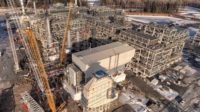In much closer election than in their 2015 sweep, Canada’s incumbent Prime Minister Justin Trudeau and the Liberal Party managed to hang on to power despite overheated political scandals and controversy over the government’s $4.5-billion purchase last year of the unfinished Trans Mountain oil pipeline project.
But his Oct. 21 narrow win of the most Parliament seats, though not a majority, and loss of the popular vote to the Conservative party sets up a minority government that will require deals with rival factions to push legislation on key environmental and economic issues on which they differ.
"The lack of a single-party governing majority raises risks that power-sharing pressures could lead to a more expansionary federal government fiscal policy and that the country's elevated general government debt may not stabilize," said Fitch Ratings in an Oct. 23 report. ""The 2020 budget will be a key signal for whether the new parliamentary makeup will lead to greater spending pressures and an increased federal deficit."
While construction sector advocates have favored the current administration’s added billions in promised infrastructure expansion since 2015, they want a stronger up-front commitment to projects as a key national economic growth driver.
Despite the pre-election release of a poor-quality “report card” to hype the infrastructure problem, industry advocates struggled for campaign attention to the issue. “Infrastructure was not as front and center in this election as we would have liked, and was not seen as a broad economic strategy,” says John Gamble, CEO of the Association of Engineering Cos.-Canada.
Mary Van Buren, president of the Canadian Construction Association, says “fluctuations” in project funding have been a key factor in “escalating labor costs followed by layoffs. This situation makes it difficult for the industry to retain apprentices, invest in innovation or even stay afloat during lean years.”
She says CCA wants a 25-year plan, “with a consistent and transparent” annual funding allocation that spells out “commitments of all levels of government.”
More imminent will be new rounds of negotiations on the reach of climate change initiatives such as the federal carbon tax that Conservatives promised to end if elected and the level of continued national commitment to oil and gas sector expansion, including finishing the Trans Mountain pipeline from Alberta to British Columbia.
Fitch speculated project completion would gain support of a Liberal-Conservative majority.
In a post-election interview, federal Finance Minister Bill Morneau told the Canadian Press that the pipeline, set to be completed by 2022,will provide as much as $500 million a year in revenue to help finance Canada's transition to clean energy sources.
But voter skepticism in western Canada of federal support of the energy sector resulted in a poor showing for Liberal Parliament candidates, including ex-federal infrastructure minister Amerjeet Sohi, who was defeated in Alberta.
Gamble says the sector is still critical to Canada’s economy. “You can’t turn off the pipes overnight,” he says, but emphasizes the need for more attention to streamlined environmental regulation. “The status quo is still problematic,” he says.
Another focus of attention will be boosting investment progress of the National Infrastructure Bank, which was begun in 2017 to propel an estimated $35 billion in public and private funds into projects.
With just a few commitments to date, Conservatives vowed to dismantle it. Gamble says the bank must “demonstrate value, but it’s premature to just shut the door. This is new money, so I’d be more concerned if money was diverted from other commitments.”
Canada-based industry firms contacted largely declined to speculate on the election outcome or on the potential impact of Trudeau’s links to the still-unresolved legal saga of Montreal design-build giant SNC-Lavalin Inc.
It became a political albatross for the Liberal administration since early 2019 related to the firm’s effort to defer criminal prosecution for alleged contract bribes before 2012 by long-departed executives, based on new management and extensive implementation of ethic programs globally.
The company—which says it no longer seeks a deferred prosecution pact that the government enacted last year as a legal tool for all Canadian businesses, similar to what exists in the U.S. and Europe—has yet to face trial.
But the firm's shares rose 14% on the Toronto exchange on Oct. 22 following analyst speculation that under the reshaped Liberal government, SNC-Lavalin could now win a settlement of its criminal charges, according to Canada's Globe and Mail newspaper.
"There is still some hope that the [deferred prosecution agreement] is an appropriate mechanism to address the SNC situation,” said Maxim Sytchev, an analyst at National Bank of Canada.Trudeau has faced political heat for alleged efforts by him and staffers to intervene in the settlement process.
Meanwhile, the looming legal issues and global market impacts have hammered SNC-Lavalin’s bottom line and corporate value over the last several quarters. It has announced layoffs in Canada and the likely selloff of some units.
Media reports earlier this month speculate on talks with Singapore-based sovereign wealth fund Temasek to spin off design firm WS Atkins, which SNC-Lavalin bought in 2017 for $2.6 billion.
Former Atkins CEO Uwe Kruger now is a senior fund manager. Both firms denied the speculation in the reports.







